The Situation
An outbreak of Ebola Hemorrhagic Fever occurred in Guinea in March 2014. One theory is that it moved from an animal host, such as a fruit bat or monkey, to humans, when someone butchered an infected animal or consumed fruit contaminated by animal feces or saliva. Ebola is spread by contact with infected victims’ body fluids, including blood, sweat, and tears. Because it was not contained, Ebola began to spread among these people who traditionally greet each other, often with long hand-shakes, and who wash the corpses of deceased loved ones and often touch and embrace the deceased during funeral ceremonies. A corpse of a victim is highly contagious for weeks. Ebola has by now spread in Guinea and into neighboring Sierra Leone and Liberia and has infected over 5,800 people, killing 2,800 of them. The actual numbers are probably much higher because infected people are afraid to go, or bring infected loved ones, to isolation centers, preferring to have them die at home. This causes many more people, especially caregivers, to become infected. Many professional caregivers, including nurses working in hospitals, have also become infected. Four medical doctors in Sierra Leone have died of the disease. About 60 percent of Ebola victims admitted into the centers do die, and the bodies are not returned to the families but are enclosed in plastic bags and buried in common graves.
This Ebola epidemic, the largest in history, has become a catastrophe. But unlike an earthquake or flood, it is slow moving. It is like the civil wars that overran Sierra Leone and Liberia, where the enemy is brutal and capable of striking almost anywhere. But at least in the wars, the people could see and hear the enemy, have some ideas of where they were striking, and could at times run away.
Some Good News and Some Bad News
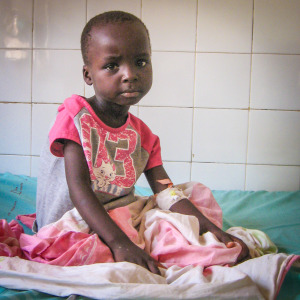
In March, at the same time that Ebola Fever was just breaking out in Guinea, Brima Jawara, age 7, was admitted to the Holy Spirit Hospital in Sierra Leone. A catheter was administered to help Brima pass urine and to reduce the extreme pain he suffered. Because ultrasound scanning could reveal no cause for Brima’s problem, the decision was made to send him to Ghana. There, a non-invasive scope was used to determine that the blockage was caused by a bladder stone. Finally, in June, the stone was surgically removed and, according to the surgeon, “Brima was able to urinate without pain for the first time in years.”
In May and July, 23 patients returned to Sierra Leone from Ghana after successful spinal surgery by the Foundation of Orthopedic and Complex Spine (FOCOS). All are doing well and are out of major pain. In July, because of the slight but real risk of spreading Ebola, Africa Surgery and FOCOS decided not to send to Ghana 15 more patients chosen to have spinal surgery. For most of them, this delay will mean more pain and increased deformity as their spines continue to collapse and possibly cause paralysis.
All flights from Ghana to Sierra Leone have recently been canceled due to the growing Ebola epidemic. Brima Jawara, his adult escort, and four of our other patients are now stuck in Ghana. These include a woman, age sixty, who received a hip-replacement, a ten-year-old boy who needed orthopedic surgery on his elbow damaged by a tuberculosis infection, and two boys recovering from surgery to their TB-damaged spines, all treated by FOCOS at Africa Surgery’s expense. There is also a girl, age 5, suffering with internal bleeding in her digestive tract. Exploratory surgery in Ghana by a gastrointestinal specialist did not reveal its cause, and she can only be treated medically for now. But all are in good hands living under the care of FOCOS. They will be able to return home safely to Sierra Leone, after the Ebola epidemic has been controlled and normal air traffic resumes.
The Container
In April, I started collecting and repairing old treadle-style-foot-powered sewing machines in the basement of the rectory at Assumption Church in Morristown. These are intended for some of our recovered spinal-surgery patients to learn the tailoring trade. We hope to one day set up, in conjunction with one of our partner organizations, KITE-SL, a skills training program for disabled persons and a prosthesis workshop where back braces, leg calipers, and other devices can be fabricated. KITE-SL is a registered disabled persons’ organization operating in Sierra Leone’s capital city, Freetown. Thanks to a generous response from donors, we now have 22 treadle sewing machines that can be used where there is no electricity, and eight electric machines that can be put to use in the places where power is at times available. We will send them to Sierra Leone in a 40-foot container. Other donated items being sent include wheelchairs, crutches, walkers, eyeglasses, tooth brushes and paste, surgical gloves, bandages and medical supplies, shoes and clothing, bicycles, hand sanitizers, luggage bags, carpentry and mechanics tools, and more.
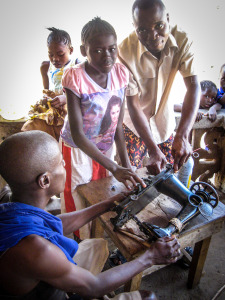
since her spinal surgery in 2004, and Ansu Kamara with us since 2010, clean an old treadle-sewing machine donated to ASI in 2012.
I have purchased many items with Africa Surgery funds to add to the container. They were requested by the Director of the Holy Spirit Catholic Hospital and the Director of the Loreto Clinic of the Sisters of St. Joseph of Cluny, both located in Makeni, about 100 miles inland from Freetown. These include some standard laboratory and hospital supplies such as microscope slides, gauze and bandaging, blood collecting syringes, etc., along with items to protect medical workers against Ebola virus infection, including exam gloves, face masks and shields, isolation gowns, haz-mat boots, and non-touch thermometers. The generous quantities we are supplying still might not be sufficient, should the Ebola epidemic continue to grow and infected patients begin to flood into the two facilities. There is concern that supplies sent in by large international organizations will be distributed to government hospitals and that private or religious based facilities, like these two Catholic ones, will be ignored except by some few smaller organizations like Africa Surgery partnering with them.
Our Programs: an Update
Our in-country programs are continuing to the degree possible, although foreign surgical teams have stopped visiting, and operations by local surgeons have mostly been placed on hold. Since the first of April, 56 patients have had hernias surgically repaired with 20 of these being bi-lateral (occurring on both sides), 22 have had cataract or other eye surgery, many more are still being treated with eye medications, 140 people have had one or more decayed teeth extracted. Scores of patients had been receiving medical treatment at the Holy Spirit Hospital and the Loreto Clinic for endemic illnesses such as Malaria and Typhoid, but the number has dropped because of the fear of Ebola. Many people no longer seek help at hospitals, and many will likely die at home from these treatable illnesses. Schools closed in early July for the annual recess and will not reopen until after the state of emergency called by the government is lifted and the Ebola threat eliminated or greatly
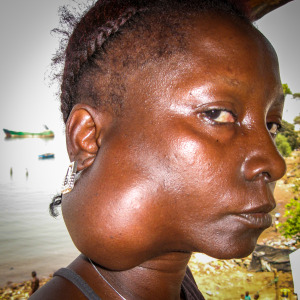
reduced. At that time the students sponsored by Africa Surgery donors will receive their promised help.
Three men suffering with urine blockages received surgery by a Sierra Leonean specialist at the Connaught Government Hospital in Freetown. Two more of our patients with this problem had catheters administered and were sent home with some medication to wait because the hospital closed in August, after a top physician, Dr. Moduphe Cole, died after contracting Ebola from the first Ebola victim to visit the hospital. The hospital has reopened, but the surgical programs have not yet resumed.
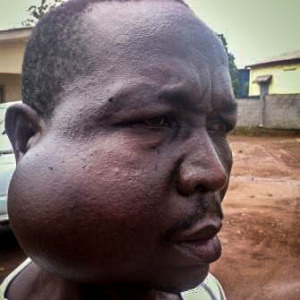
Dr. Don Davis, the only oral surgeon in Sierra Leone, treated 21 of our patients suffering with painful abscessed jaws at Connaught Hospital. The process often requires multiple surgeries and extended medication. Working with a maxilla-facial surgeon from Cuba, Dr. Davis also removed facial tumors from three patients at Connaught Hospital. Three more of our patients are now waiting for the surgical programs to resume so that their tumors can be removed. For at least one of these it might become too late, if the tumor is malignant.
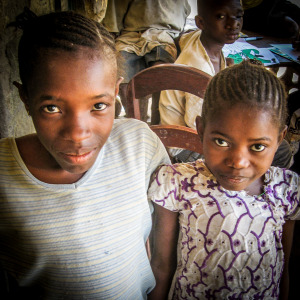
More on Ebola
Since 2003 we have helped hundreds of people in Sierra Leone with a wide range of medical and surgical needs. There are now 116 of our recovered spinal surgery patients living in almost every part of the country. Twenty-three young patients are located in one village under Africa Surgery’s care because they are orphaned, were abandoned, or their families cannot take adequate care of them. Some of them have been with us for eight or nine years. I have stayed with them for months during my annual visits, and have gotten to know them very well. So far Ebola has come close but not into our village. It is agonizing to know that it can easily do so. As much as I want to be there to, hopefully, calm their fears should they become infected, at this time the risk of dying is too great, when so many are depending on my help, including three paralyzed children and one paralyzed adult.
Those under Africa Surgery’s full care have been provided with bleach-solution hand-washing-stations. They were instructed in how to avoid becoming infected with Ebola by a team from the government health clinic located in the village, and they continue to get instructions from their Africa Surgery caretaker. One hundred miles away, our helpers in Freetown have held workshops showing a power-point slideshow and distributing flyers to inform the public about the risks of contracting Ebola and how to avoid it. They mounted a megaphone to the top of our Land Rover and broadcast Ebola prevention instructions while driving slowly through local neighborhoods. Sadly, the father of one of Africa Surgery’s main helpers, a co-founder of KITE-SL, passed away on September 12, after allegedly contracting Ebola where he managed the security force at a small government hospital in Freetown. He died in isolation there, cut off from visits from his family who never got to see even his corpse. He was buried by a government burial team in a common grave. So far no other members of his household have become ill, leaving us to doubt the original diagnosis supposedly based on a blood test taken at the hospital.
In Conclusion
I will not be able to visit Sierra Leone until the Ebola epidemic is brought under control. I am staying in constant contact with the Africa Surgery Sierra Leonean team who all have cell phones. We are continuing to help as many people as we can. It is likely that we will be called upon to make more medical supplies available. We are praying that this nightmare will end soon.
Thank you to all who donated supplies for our container or who sponsored students. Please pray for the people of Sierra Leone, Liberia, Guinea and any other people who might fall victim to this epidemic, as well as for the heroic health-care workers who minister selflessly in such threatening and dangerous conditions.

